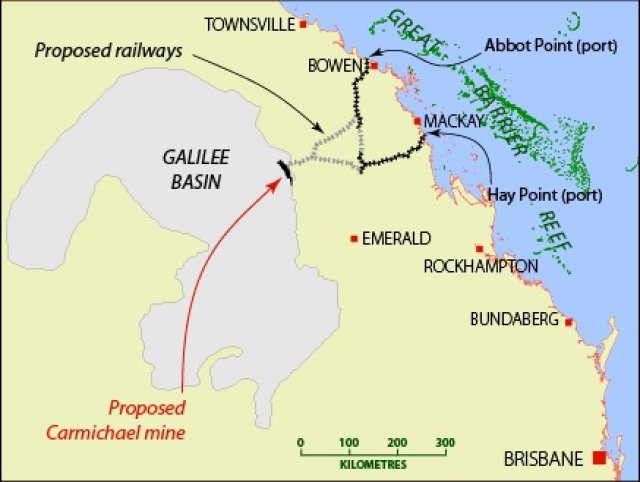
Ahead of the United Nations Climate Change Conference scheduled for December in Paris, federal resources minister Josh Frydenberg has sought to invoke “a strong moral case” to justify his government's green lighting of the Carmichael mega-coalmine in the Galilee Basin.
However, his argument is as spurious as the economic justifications made by Adani and federal and Queensland governments in support of the project.
Adani has been unsuccessful to date in attracting financial backing for the proposed mine and for the rail link and port development that are essential for the project. Moreover, given the market realities of the mining sector, the Carmichael mine is likely to become a frozen asset.
Yet the company continues with its exaggerated claims that the project will lead to job creation. Adani media releases continue to spout the original estimate of 10,000 jobs being created. This figure was disproved by Jerome Fahrer, who was commissioned by Adani to model the outputs of its proposed 30-year coalmine. He told the Queensland Land Court earlier this year that his modelling showed only 1464 net new jobs would be created.
Meanwhile, environmental activists, scientists and even business journalists have been united in heaping ridicule on Frydenberg's spin that the mine is vital to help “lift hundreds of millions of people out of energy poverty not just in India but right across the world.”
“Coal transported from the Galilee Basin to Abbott Point and then to India, is never going to be cheap, it's just likely to be cheaper than originally expected,” Lynette Molyneaux, researcher in the Energy Economics and Management Group at the University of Queensland's Global Change Institute, wrote in The Conversation on October 16.
“It certainly won't translate into cheap electricity for India's poor. India's state electricity utilities are already subsidising electricity for the poor by charging rates that are below cost using very cheap Indian coal. Who will subsidise the additional cost required to fuel the power stations with more expensive Galilee Basin coal?”
Writing in RenewEconomy on October 21, former business editor of the Australian Financial Review Giles Parkinson said: “Apart from the environmental and climate impacts of coal, the statement ignores basic economics … New analysis from researchers at Deutsche Bank suggest that prices for large scale solar projects are likely to fall to around 4.7 rupees per kilowatt hour. This will further undermine the case for imported coal, which requires prices of more than Rs6/kWh to make a return, and explains why the Indian government is so focused on solar, and domestic coal, to meet its power needs.”
It is likely that Adani, having secured approval, will not proceed but wait for cyclical upturn in commodity prices.
Adam Lucas, Senior Lecturer in the University of Wollongong's Science & Technology Studies Program, wrote in The Conversation: “The company revealed its intentions to focus on domestic mining and renewable energy in an August earnings statement to investors, and reportedly has begun discussions with landowners in the Bowen Basin to build a large-scale solar plant there.
“Although Adani itself appears to be losing interest in Carmichael, the Federal Minister for the Environment seems determined to see the project go ahead, even though it is both economically unviable and environmentally irresponsible.”
Professor Samantha Hepburn of the Faculty of Business and Law at Deakin University wrote in The Conversation: “In ignoring the impact of greenhouse gas emissions from burning the coal … the Federal Minister indicates his preparedness to completely disengage with global climate change imperatives … Approving a vast new coal plant on the eve of the Paris climate change talks, in complete disregard of its significant greenhouse gas implications, is unethical and, at a global level, indefensible.”
Like the article? Subscribe to Green Left now! You can also like us on Facebook and follow us on Twitter.